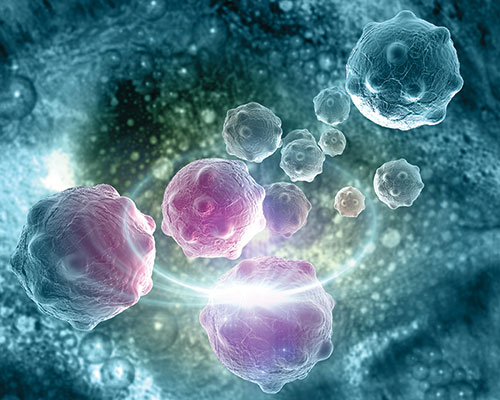
A droplet-based microfluidic technology produces micro-organospheres (MOSs) from cancer patient biopsies within an hour, according to a new report led by researchers at the Terasaki Institute for Biomedical Innovation (TIBI). They detail how patient tumor, immune, and connective tissue cells quickly form miniature tumors that retain the original microenvironment within thousands of these MOSs. The highly scalable process can be used for testing drug response and other purposes.
As outlined in their recent publication in Cell Stem Cell, tests on MOS of various cancerous origins demonstrated the retention of the cells’ genetic profiles, as well as gene and immunosuppressive marker expression of the original tumor tissues.
The work was a multi-organizational collaboration that included researchers at Duke University, Baylor College of Medicine, and Roche Pharmaceutical Research and Early Development. It was led by TIBI’s chief scientific officer and professor, Xiling Shen, PhD. Shen is also the chief executive officer of Xilis, a company built on this technology and a precision medicine platform, which raised a $70M Series A financing in July 2021.
“This approach produces thousands of mini tumorspheres, all on the same plane, within 10 days,” Shen told Inside Precision Oncology.
Existing oncogenic models, the researchers point out, have many shortcomings that make them unsuitable for clinical use. Patient-derived tumor cell lines change when sub-cultured, rendering them inaccurate as tumor models. Models made from xenografts – patient tumor cells injected into immuno-deficient mice – retain their characteristics but are time-consuming and costly to produce. Patient-derived organoids, miniaturized 3D versions of tumor tissues, lose the patient tumor microenvironment during sub-culturing, and these organoids cannot be produced in a timely enough manner for clinical decision making.
“The current state is abysmal,” says Shen. “Patients’ bodies are ravaged by drugs that end up most often not helping them much.”
The scientists used droplet emulsion microfluidics with temperature control and dead volume minimization to rapidly generate thousands of micro-organospheres (MOSs) from low-volume patient tissues. Initial tests using MOS from a small cohort of metastatic colorectal cancer patients were screened against a panel of therapeutic drug candidates. When the drug sensitivity results were compared against actual clinical treatment outcomes, there was almost perfect correlation. What’s more, the MOS could be generated from small numbers of cells, as typically collected from biopsies, and the whole MOS generation and drug screening process took less than two weeks.
“Because tumors are heterogenous,” Shen says, “it’s not a black and white answer. But you will see how responsive the tumor may be to a particular drug and how resistant.” With that information in hand, oncologists should be able to make faster and better-informed treatment decisions.
In a series of subsequent experiments, the researchers developed assays to test the MOS response to immune therapies. They were successfully able to demonstrate that bispecific antibodies mobilize resident immune cells in the original microenvironment to attack tumor cells, an unprecedented achievement in immunotherapeutic screening. In another series of experiments, the scientists tested their MOS against the effects of combination immune therapies and were able to demonstrate both predicted responses and optimization of multiple treatment regimens.
They were also able to observe effective penetration into the MOS by activated T-cells and subsequent killing of the MOS tumor cells. Such T-cell infiltration was achievable due to the small size and large surface-to-volume ratio of the MOS droplets, mimic natural diffusion limits within tissues and could not be obtained using conventional models.
Xilis currently has platform capabilities for breast, colon, and other cancer testing, as well as pharmaceutical drug discovery and development.











